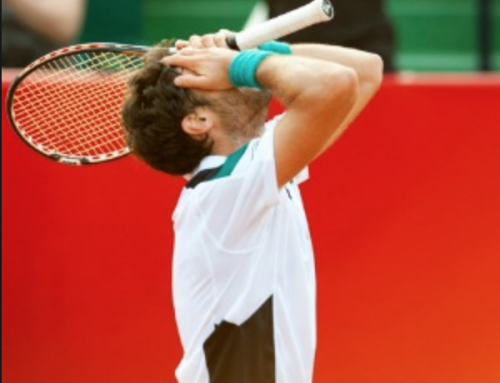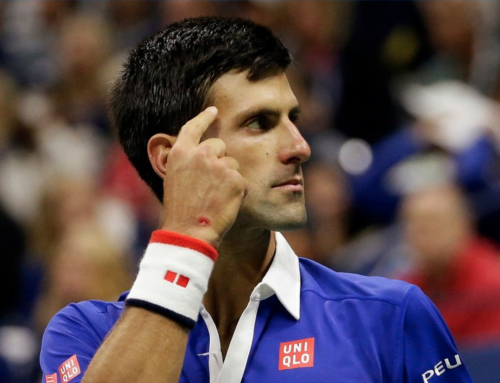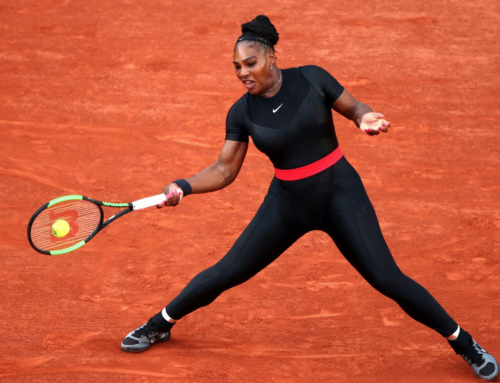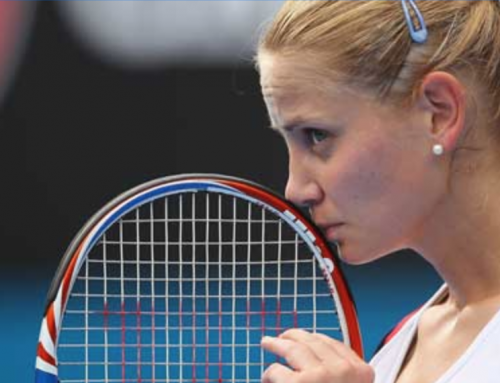Mental tennis is definitely a favorite topic here at Essential Tennis, Dr. Patrick Cohn knows why: it’s a great way to improve your tennis game! Dr. Cohn and I discuss three quetsions from listeners about their mental game. The first topic is about exploiting mental weaknesses of your opponents. The second is dealing with a doubles partner who’s mentally weak. Lastly we discuss how to avoid being a perfectionist in your tennis game!
Download Transcript: Word Doc | PDF | Kindle | Text
Welcome to the Essential Tennis podcast.
If you love tennis and want to improve your game, this podcast is for you. Whether it’s technique, strategy, equipment or the mental game, tennis professional Ian Westermann is here to make you a better player. And now here’s Ian! .
Ian Westermann : Hi and welcome to the Essential Tennis podcast. Your place for free expert tennis instruction that can truly help you improve your game. Today’s episode of the Essential Tennis podcast is brought to you by summersetsportsperformance.com.
Thank you very much for joining me on today’s show. Before we get today’s topics and guest, I would like to let you gusy know about two quick things .. The first one is a new blog at essentialtennis.com and that is the WTA tour news blog– news all about the women’s professional tennis game. To check that blog out, a ll you have to do is go to essentialtennis.com/WTAnews.
Next up, I just want to let you guys know about the upcoming Essential Tennis Live show which will be airing this Thursday at 8:30pm EST. Myself and my co-host Ron Miller are going to be talking about the NTRP rating system this week, the pros and the cons of the system, what’s broken, what needs to be fixed. If you have an opinion about that topic and would like to talk to us live during the show, check it out. Again this Thursday, at 8:30pm EST. To find out where to go, just go to essentialtennis. Com/ live. Alright, let’s get started with the show. Sit back, relax and get ready for some great tennis instruction.
My guest today on the Essential Tennis podcast is Dr. Patrick Cohen. Dr. Cohen is at sportspsychologytennis.com and hosts a tennis podcast of his own , it’s called the tennispsychology podcast and you guys can find that on his website or on the iTunes music store. He does a great job with that podcast and if you guys go check his podcast out on iTunes, he’s got 46 episodes, all archived there. So a lot of great information about mental tennis, the mental part of the game in tennis. Dr. Cohen, welcome to the show.
Dr. Cohen : Thanks for having me in, I enjoy talking to you once again about the mental aspects of tennis.
Ian : Absolutely, and it’s such a big part of the game for recreational players , average level players and high performance players as well. And I know that you spend a lot of time working with national ranked junior players on the mental game specifically so I know that you’re going to bring a lot of value to the listeners of my show. So thanks very much for spending some time with us..
Dr. Cohen : Great..
Ian : Alright, let’s go ahead and get started and we’ve got three questions here that hopefully we have time to get too and these all come from listeners of the show who posted their questions on the forums at essentialtennis.com. Our first question that we’re going to talk about comes to us from Joe in Louisiana. Joe wrote and asked, “I’d like to turn the mental tennis subject around a little and hear about how to recognize mental issues in my opponent, aside from the obvious. And how to exploit them.’ What do you think Dr. Cohen?
Dr. Cohen : Well, it’s definitely a part of I think playing tennis, is being able to react to your opponent. However, you don’t want to get so stuck on what’s going on with your opponent that you forget your game plan and you forget your strategy on what you are doing out there.
What do you want to look at, what do you want to observe? I think the most obvious thing is when a player is upset– when your opponent is upset , you know you have the momentum and you have the kind of mental edge at that point.
And you can take advantage of that. One of the things I see, the problems that player’s make is , they get out to a lead in the set, maybe they get out to 3 love or 4-1 or whatever it may be and sometimes they see that their opponent is down, they see their opponent as frustrated and then they let off the gas. They take their foot off the gas and they try to coast. And that could be very dangerous in that situation .
I think when you see that you have your opponent down, and your opponent maybe frustrated, I think that is the most obvious thing that you can see, well that’s one where you want to put your pedal to the metal as we say and you want to play even at that point or you want to go ahead and harness that momentum that you have to finish off the set or to finish off the match.
In addition, I think you can see changes in confidence in players as well , that’s another thing that you want to look for as well. Even how a player walks onto the court … Some players walk onto the court , they look like they own the court whereas other players walk on , they look kind of meek or look not very confident. They have their head down, their shoulders are slump . So you can certainly use that to your advantage in terms of knowing when you have the momentum because if your opponent doesn’t have the momentum, then they look rather like they are lacking confidence in their game.
That should give you the momentum. If I turn it around a little bit when I talk to my players, I never want to allow your opponent to see you down or see you frustrated or lacking confidence. Because you are giving them energy. You are giving them momentum. So if you are on the other end of that, make sure that you keep your reactions neutral to bad shots, for example. And you don’t show your opponent that you’re frustrated or that you’re lacking confidence or you’re down. Because now, momentum is shifting big time. What is your whole take on this Ian?
Ian : Well, I think you gave a lot of great advice there and I agree that the number one way to tell if you are doing something correctly, or doing something well, is by watching your opponents physical response and really it’s their emotional response to whatever happens to be occuring during the match play . And yeah, physical cues that you mentioned walking out on the courts and looking timid or unsure of oneself but even between points, maybe after hitting a particularly good shot against your opponent and they get frustrated , maybe they hit a poor shot and get frustrated and it really, at the top level of junior tennis or any level of junior tennis I guess we could say .
I would assume you see this a lot Dr Cohen, is kids who are really very competitive , not terribly emotionally mature yet, and so I would assume that a lot of times you see emotional outbursts at points of time during the match when they get frustrated. Their opponent is doing something that is being effective and their way of doing it is kind of dealing with it is being outwardly frustrated. Is that fair to say? Do you see a lot of that?
Dr. Cohen : Absolutely I just recorded a video on this particular topic on my website at sportspsychologytennis. Com and it is the highly competitive , the athletes that work very hard and their game, put in a lot of time that want to win really badly , there most likely to become upset quickly with their game when they hit a bad shot or when they are getting beat. They hate to lose essentially .
Ian : Yeah, absolutely.
Dr. Cohen : So yeah, you can certainly watch for some of those cues but once again, I don’t think you want to really depend upon exploiting their lack of mental toughness. Once again, when I mean depend upon, Ian, I think you can get to a point where you focus too much on their reactions after points and after games and on the change-overs. Rather than controlling your own emotions, controlling your own confidence, between points as well.
So, just be careful that you just don’t get to lopsided with your strategy is to go out and exploit your opponents lack of mental toughness. I don’t think that’s a good strategy. You can certainly , as we’ve said, look at the cues that are going to help you gain the momentum and gain confidence. But don’t get so obsessed with what your opponents reactions are that you can’t make adjustments yourself..
Ian : Yeah, I think sometimes we can sometimes caught up with maybe enjoying our opponents downfalls maybe too much. And maybe playing for that a little bit too much and kind of trying to egg them on. Those of us who are more competitive who are listening and I can definately say that I’ve been guilty of that. I think the best advice that you gave there Dr. Cohen, was remember your game plan , remember what you were doing well that got your opponent frustrated. Don’t deviate from that for the sake of getting them more angry. Just keep the pedal to the metal and also don’t let up and say ‘Oh great, I’ve got this match won”, and relax. Lots of good tips in there and excellent stuff. Let’s go ahead and move onto our 2nd question and this question comes to us from John and he wrote and asked, “when playing doubles what tips can you give me to help the situation when my partner starts falling apart mentally?”
Dr. Cohen : Great question. I just witnessed this yesterday as a matter of fact where a saw some players playing team tennis in an advanced team tennis league and the two players were essentially they were frustrated with each others game. It’s so critical in doubles and I think it’s so critical to be able to support yourself. And support your partner at the same time because you’re not only playing for yourself, part of the pressure in doubles is that your playing for your partner as well so some players are very very in-tune with the ‘I don’t want to disappoint my partner. I don’t want to let down my partner. ‘ So when they hit a bad shot and they lose the point, it’s almost twice as hard to take for them because they hit a bad shot. Their person hit a bad shot but they also are letting feel like they are letting down their partner as well.
So that’s why it is so critical for the partner to come in and say ‘hey it’s OK. Let it go , let’s get to the next point. ‘ So any interaction at all. I think the worst thing you could do would be to just go back to the service line, or go back to your return of serve position and not say anything to your partner that’s really falling apart and is frustrated. You have to say something, you have to attempt to interrupt whatever negative script that your partner has in his or her head.
Even if it’s just a neutral statement, like ‘come on let’s go. come on let’s get to the next point. ‘ You have to be able to get them in a state where your OK with their mistake. That everybody is going to make mistakes so just saying something like you aren’t perfect , we’re going to lose points. It’s OK . As long as we focus on the next point with full confidence and full focus , you know we’re still right in this match. It’s so critical in team play or doubles play. I see it over and over again where players essentially can feed off their negativity or you have a very positive player that can turn the whole thing around because that partner is trying to lift up the partner that has the tendency to get down. .
Ian : I agree. I see this pretty commonly as well where one player will make a bad error and their partner does the classic head drop and like shoulder slump and just make the [inaudible] movement with their body. And that is not going to help your partner out. You guys need to be supportive of your partner emotionally and take responsibility and take responsibility for their emotional state. You’ve got to help them out and all the tips that Dr. Cohen stated there are definitely very important. So, Dr. Cohen, what would you say to the player who says ” well you know, I’m doing my best, I’m trying to be supportive. I’m trying to give them neutral or positive feedback even after they are making a mistake. However, they just keep on getting more and more down on their selves. They keep getting more and more negative . What does John do in that situation where their partner just can’t pull out of that negative tail-spin and they just keep on getting more and more negative. What would you say to that? .
Dr. Cohen : Try to get them to laugh or seriously or have fun. I think when a player having fun and laughing, that’s going to override any of that negativity and it can be kind of a stress reducer right? We know that laughing can reduce stress as well. So if you can find a way to play a little games, or just laugh at it with your partner and get them laughing like it’s OK. I think you’re going to be able to pull them around , that would be plan B in my opinion. But, when a player is frustrated and when they are down, they are certainly not having any fun. They are being too serious and they are not having any fun with their game. And frankly, it’s not a lot of fun to play with that type of player, right?
Ian : I agree. And our next question is actually going to deal with that. The player who maybe takes it a bit too seriously and is really hard on themselves but I think that’s good advice actually . It can be very difficult to reason with that type of player who just kind of seems really set in their path of being negative and really just having the idea that this is just a bad day. And nothing is going my way. Every shot is poor and you guys are going to play with people who just kind of fall into a negative attitude like that quickly. I’ve got to admit, I didn’t see it coming the advice to make them laugh but I do think that’s a good idea. So anything else to add to that before we go to our last question Dr. Cohen?
Dr. Cohen : No, I think when you’re not as serious and you’re having fun, that will take care of a lot of issues. .
Ian : Alright, good stuff. And with that, let’s go to our final question, which is from Dana from Nebraska, and I’m happy that Dana brought this up because it’s something that I personally have struggled with as well in the past in my competitive play. And he wrote and said “how can I keep from getting down on myself. Or what can I do to get myself back out of the slump when I do get down on myself. When I miss a couple of easy shots that I should’ve made , I get really down.
I see pros missing shots in their matches so I know perfection is impossible , yet I seem to think I should be perfect. ” That starts a downward spiral, I tense up, and start missing more shots and it feels even worse in doubles– I feel like I’m letting my partner down, so I tense up even faster . And this is such a good question, and it kind of goes back to what we were talking about a second ago , Dr. Cohen, that kind of downward spiral and being a perfectionist and as I said, a second ago, this is something that I have struggled with myself thinking that I shouldn’t miss shots which obviously is unrealistic. How do we deal with that? For those of my listeners that are kind of a perfectionist by nature, how can we get ourselves out of that trap feeling that we should make every shot and getting negative when it doesn’t happen. .
Dr. Cohen : Well let’s start with the positives. And the positive as a perfectionist is you do many things well and I know you are very motivated, I know you are very committed and you’re trying hard all the time and trying to give 100% effort. So there are some real advantages of that perfectionism when it comes to your practice and your practice happens and your work ethic and it’s probably one of the reasons why you’ve been able to succeed at some level in your tennis game. But there is a huge downside to perfectionism and it seems like 8 out of 10 athletes that contact me to work on the mental game, are in this mold of perfectionist. Because they see that how much it is getting in the way, they realize how much it’s getting in the way. What’s really interesting, is this person’s rationalizing as… What’s the name of the person asking the question?.
Ian : Dana.
Dr. Cohen : Yes. Dana is rationalizing that she see’s that the pros miss shots, they know that perfectionism is impossible yet she seems to think that she should be perfect. There is two or three should’s in that question, and that to me is at the heart of the issue. The should’s are the expectations that you take out on to the tennis court that I call those, setting yourself up for frustration. In other words, perfectionist set very high, or what I call strict expectations or demands about their performance. About how they should play, whether they should win or lose obviously a match, how they should hit the ball, how they should serve. And then when they don’t perform up to those expectations, and in this case , it’s missing a couple of easy routine shots.
When they don’t perform up to those expectations it makes it very difficult for them except, so there is really no level of acceptance about their performance when they think their under-performing or they aren’t performing up to the expectations. So that’s the very first part of it, is that you have to learn how to manage those expectations. I can talk all morning on this particular topic, because there is so much that goes in to perfectionism, but when I say manage those expectations, I’m not talking about confidence. Most of the time, athletes have very very high expectations , but low confidence. I call that the confidence expectation connection. And that’s the recipe for disaster. The recipe for success is to have very high confidence without the expectation that is attached to that. And athletes by and large group those two concepts together like they are one and the same. If expect to win , or I expect to play perfectly, then I must have confidence. No.
Expectations are demands that you play upon your performance , they turn into pressure and they also turn into self-judgement, self-critical or self-judgemental behaviour. When you’re not performing up to those expectations. So you identify the expectations and demands . In this case, it’s easy for me to see to see that she should not miss easier routine shots. That’s just unacceptable. So that’s an example of the expectation that is embedded in this question. Now, my process for this is to be able to turn that expectation into what I call something that is more manageable or a more manageable goal , or a more manageable objective. I call that a process-goal.
So maybe it’s as simple as having good foot work for example. Something that’s a little bit more manageable but it doesn’t have the demand of I have to execute that routine shot 100% of the time. So you try to tweak out the expectations and you replace them with things that are more manageable that the players are going to do 9 or 10 out of 10 times on the court. And then it’s a lot mroe difficult for that player to be judgmental #1 , and get upset when they think they are under-performing. So as I said, there is so much that goes in to the whole thing about perfectionists because a lot of my programs that I do with athletes are addressing some of the downsides of perfectionists. .
Ian : Well, I got to tell you Dr. Cohen, I had probably three of four ‘aha’ moments while you were talking there. And that was some really great information and especially for myself personally, where you were talking about the difference between setting expectations for yourself and that as opposed to being confident and those two things not necessarily being the same thing. That really makes a lot of sense and yet it’s something I’ve never heard anyone talk about before is that connection between expectations and confidence.
So, how do we train ourselves to be confident rather than setting expectations in stone and saying, like you were talking about having the word ‘should’ in there. I should make a short easy forehand. I should make it so when it doesn’t happen, there is an automatic feeling of failure there . How do we replace that with just being confident and maybe telling ourselves, ‘I can make that shot. ‘, or that’s a shot that I’m good at and not necessarily attaching a pressure of having to do it. .
Dr. Cohen : Yeah, not even the pressure of having to do it , but the judgment that goes with it. Confidence doesn’t include judgment. So, for example, like you said, confidence is strictly a belief in your ability to execute that routine shot. It doesn’t say anything about the , if you miss it, you need to judge yourself and beat yourself up, right? But the expectation does. So the first part of that is knowing the difference between the two and making sure you are clear with those.
Confidence is the belief that precedes your performance. It’s the strength of your belief that you can execute that shot, where it’s expectation is putting the demand and the pressure on yourself that you have to and you should and you must execute that shot 100% of the time. So, confidence, you know I tell my players all the time, you can see the serve.. I don’t want to call it a perfect serve, but you can see the ideal serve in your mind before you hit it to build confidence, right? But that’s doesn’t mean that you have to execute that. So sometimes, there is a disconnect for players there .
They see in their mind what they are capable of on the serve, or any shot for that matter. I’m just using the serve as an example where you might visualize the ideal serve that you’re capable of hitting in that situation but then they don’t execute that, or they don’t perform that serve and they make a double fault– there is a disconnect because they think that they should execute what they see in their mind . Players have to understand that you want to set yourself up for optimal performance by believing in it and seeing it. But yet, you have to understand that it’s not always going to come out that way.. It’s just the way the human body is setup and human nature is , it’s not going to be exactly as you envision.
I’ll quote someone from the world of golf, who some of your listeners may know a guy named Ben Hogan which was one of the best ball strikers in the history of golf. He said that during a round of golf where you hit maybe 70 shots or so, he envisioned only three or four of those shots were executed just as he envisioned out of 70. And he was one of the best ball strikers, most consistent ball strikers in golf. So, you certainly want to set yourself up with a belief that I can execute but you have to let go of the judgement about how did that execution go and be more self accepting.
Ian : Dr. Cohen, I really enjoyed that explanation from you a great deal. And as somebody who has struggled with these very issues a lot in the past , I can really appreciate that information a great deal and I know that my listeners are going to appreciate it and enjoy it very much as well. So, I’d like to thank you very much for spending time with my self and talking to my listeners — it’s been great to have you on the show and I look forward to having you back again soon..
Dr. Cohen : Great, wonderful to talk to you again Ian and I will talk to you again soon. [music] [music] [music]
Alright, that brings the Essential Tennis podcast #89 to a close. Thank you very much for joining me today and I hope that my conversation with Dr. Cohen was informative to you and interesting . I always enjoy talking about mental tennis a great deal . Now in wrapping up today’s show, I’d like to do three quick shout-outs.
The first one is to Joe in Louisiana who this past week was kind and generous enough to send a donation to essentialtennis.com. So Joe thank you very much for your support, I appreciate that a great deal and those funds will go directly towards the cost of keeping up essentialtennis. Com– so I appreciate that. Also, two people on the forums recently have crossed over the 1000 post mark. And fightfan in California, and BrianMark in Nebraska have both passed over 1000 posts on the forums. So those are both two very important people to the essential tennis community.
I really appreciate you guys enthusiasm and the time that you’ve put in on the forums talking to other members and also exchanging ideas and thoughts with myself about the website and the forums just wouldn’t be the same without you two guys– so great job to both of you. Alright, that does it for this week. Take care everybody, and good luck with your tennis. [music] [music]







